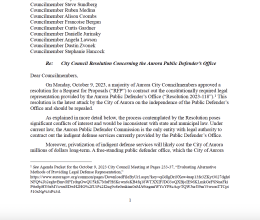DENVER – The American Civil Liberties Union of Colorado filed suit this morning challenging an anti-panhandling ordinance recently approved by the City of Grand Junction. According to the ACLU complaint, the ordinance bans a wide swath of speech that is protected by the First Amendment.
Although Grand Junction officials have claimed that the ordinance aims only at “aggressive” panhandling, the ACLU contends that most of the provisions are written so broadly that they also apply to peaceful, non-intrusive requests for assistance, such as a person sitting silently with a sign seeking a donation.
The law prohibits all panhandling after sunset and in any of a dozen additional locations and situations specified in the ordinance, such as within 100 feet of a bus stop or a school.
The ACLU lawsuit, which seeks to stop enforcement of the ordinance before it goes into effect on Sunday, March 23, was filed on behalf of five individuals, including a street performer and a former member of the US Coast Guard, as well as Humanists Doing Good, a local nonprofit organization. All engage in peaceful expression that the new ordinance has unjustifiably made a crime punishable by up to one year in jail, according to the ACLU.
Among the speech banned by the ordinance is any solicitation of a person defined as “at risk,” a category that broadly includes all persons over 70 and all persons with mental or physical disabilities.
“The only conceivable reason for banning polite, non-intimidating solicitation of older and disabled persons is a mistaken and stigmatizing view that they cannot make their own decisions with their money,” said Silverstein.
According to the lawsuit, the city’s true goal is not to target aggressive panhandling but to provide police with a tool they can use to tell homeless persons and poor panhandlers to move on and to reduce the presence of impoverished beggars in Grand Junction.
“Although the ordinance technically applies to Girl Scouts selling cookies, Salvation Army bell ringers, street musicians seeking donations, petition circulators gathering signatures, and commercial vendors, the true targets of this measure are homeless and poor persons asking for financial assistance, even when they do so in a polite, courteous, and nonthreatening manner,” said Mark Silverstein, ACLU Legal Director.
The ACLU of Colorado has a long history of opposing laws that target the homeless and limit speech protected by the First Amendment, including a successful challenge in late 2012 of a sweeping ordinance that designated 12 blocks of Colorado Springs as a “no-solicitation” zone. The ordinance was repealed after a federal judge’s preliminary ruling found that it was “likely unconstitutional.”
Today’s lawsuit, filed in federal district court in Denver, requests a temporary restraining order and a preliminary injunction, along with an expedited hearing. In addition to Silverstein, the plaintiffs are represented by ACLU staff attorneys Sara Neel and Rebecca Wallace.
more on this case
